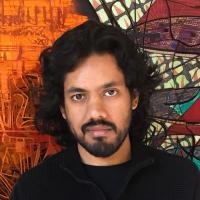Assistant Professor of Neuroscience; Principal Investigator at Columbia's Zuckerman Institute

As a sixth grader in India, Vikram Gadagkar formed a birdwatching club with his friends. One day they spotted some yellow-wattled lapwings behaving strangely in a clearing. As the children watched behind a bush, the birds lined up and ran at each other, heads down, before splitting off into pairs.
No one had ever reported this unusual courtship ritual before. So Gadagkar and his friends published their observations of the behavior in a research paper still cited on Wikipedia.
“I’ve wanted to be a neuroscientist since I was a child,” said Dr. Gadagkar, PhD. “You could call this my first research experience.”
Today, Dr. Gadagkar continues to study bird courtship, as a neuroscientist and principal investigator at Columbia’s Zuckerman Institute. He’s investigating both how male finches learn to sing and how female finches judge the quality of those songs.
But his journey – from backyard birding to brain research – took some twists and turns along the way.
After studying physics in college, Dr. Gadagkar investigated unusual states of matter in graduate school: superconductors, supersolids and superglasses. He explored the strange behaviors of helium chilled to ridiculously cold temperatures.
Then, he attended a lecture on songbirds. He realized that the time had come to return to his childhood interests of neuroscience and birds.
“I had been studying properties that emerge when millions of helium atoms interact with each other,” said Dr. Gadagakar. “I switched to properties that emerge when millions of neurons interact in the brain.”
As a postdoctoral researcher at Cornell University, he applied his expertise in physics and engineering to investigate what happens in the brains of young male finches as they learn mating songs from their fathers. He discovered that as these would-be Romeos practice their tunes, making constant comparisons to what they’re hearing from their dads, cells in their brains release dopamine to help them spot mistakes and hit the right notes.
The finding proved to be evidence that male finches, like concert pianists, operate in two different modes: a practice mode for learning (tied to dopamine) and a performance mode for impressing. Understanding the neurochemistry of this trial-and-error process could have implications for diseases, such as Parkinson’s.
“People with Parkinson’s have deficits in dopamine and deficits in learning,” says Dr. Gadagkar. “That’s a connection we would like to explore.”
With support from the Searle Scholars program, he’s also branching out to study the female of the species – far less studied than the male.
“Most people in this field have focused on the male, so the female has been largely neglected,” said Dr. Gadagkar. “This reflects a broader bias in neuroscience as a whole to focus on male brains.”
Dr. Gadagkar hopes that understanding how females judge the songs of males when deciding whether to mate will deepen our knowledge about how brains evaluate the actions of others in general. This work could yield insights into autism, for instance, which is characterized by difficulty interpreting the behaviors of others.
As he dives deep into the female brain, Dr. Gadagkar is also partnering with scientists from the Institute’s Center for Theoretical Neuroscience to create new ways of analyzing birdsong and neural data. He’s collaborating on mathematical models that represent how different brain regions work together in birds, which could be useful for improving artificial intelligence.
“Ultimately, we want to understand three things: how we learn, how we express these learned behaviors,and how we evaluate the behaviors of others,” said Dr. Gadagkar, “I can’t think of a better place to investigate these topics than the Zuckerman Institute, with its amazing crosstalk between theory and experiment.”
Peter and Patricia Gruber International Research Award (2018)
K99/R00 Pathway to Independence Award (2017-present)
Simons Collaboration on the Global Brain Postdoctoral Fellowship (2016-present)
Scholar (2021)
Gadagkar V, Puzerey PA, Chen R, Baird-Daniel E, Farhang AR, Goldberg JH
Science.2016 Dec 9
Gadagkar V, Goldberg JH
Neuron.2013 Dec 18
Pratt EJ, Hunt B, , Yamashita M, Graf MJ, Balatsky AV, Davis JC
Science.2011 May 13
Hunt B, Pratt E, , Yamashita M, Balatsky AV, Davis JC
Science.2009 May 1